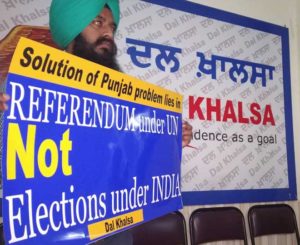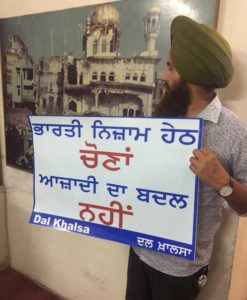Dal Khalsa releases No Election manifesto, supports pro-rights candidates
The senior leadership of the Sikh pro-freedom party Dal Khalsa, on expected lines, released its No-Elections manifesto in Amritsar today, reiterating its stand for referendum in Punjab through a Quebec or Scotland type right to self-determination for the people of Punjab.
![The senior leadership of the Sikh pro-freedom party Dal Khalsa, on expected lines, released its No-Elections manifesto in Amritsar today, reiterating its stand for referendum in Punjab through a Quebec or Scotland type right to self-determination for the people of Punjab. While mainstream Punjab-based and Indian political parties have finalised their candidates and election pitch for the 13 Punjab Parliamentary constituents is steadily increasing by the day, the pro-Sikh freedom party Dal Khalsa has presented its exhaustive no-election manifesto, based […]](https://www.theworldsikhnews.com/wp-content/uploads/2019/05/Dal-Khalsa-360x270.jpg)
While mainstream Punjab-based and Indian political parties have finalised their candidates and election pitch for the 13 Punjab Parliamentary constituents is steadily increasing by the day, the pro-Sikh freedom party Dal Khalsa has presented its exhaustive no-election manifesto, based on its ideological stand, misgivings about Indian democratic working and fallacies of the Indian constitution; alongside in a politically correct move, Dal Khalsa announced support for Paramjit Kaur Khalra from Khadoor Sahib, Simranjit Singh Mann from Sangrur and Dr Dharamvir Gandhi from Patiala constituencies respectively.
Asserting that the Indian democratic system was not conducive to attaining a sovereign Punjab through the current electoral processes, Dal Khalsa stated that after a series of discussions and debates, the party has resolved to stay away from the elections to be held on May 19.
Party president Harpal Singh Cheema, in his opening remarks in the media meet said that “elections cannot be substitute to right to self-determination.”
“Elections cannot be substitute to right to self-determination.”
“The solution to the Punjab problem lies in referendum under United Nations and not elections under Indian dispensation. Our party envisages an arrangement like Quebec in Canada and Scotland in the United Kingdom, wherein it is possible to make right to self-determination an election agenda, subsequently leading to the right to secede”, he added.
“Dal Khalsa as an organization is not against the principles of democracy, but has decided to stay away because of serious misgivings in the Indian electoral system. Sikh aspirations cannot be sacrificed at the altar of such a game of elections where money, liquor, drugs and even caste and class are key factors.”
” “Dal Khalsa wishes good luck and success to Simranjit Singh Mann and Bibi Paramjit Kaur Khalra – as both had emerged as symbols of dissent and resistance to Indian domination, and also to socialist leader Dr Dharamvir Gandhi, who has been relentlessly fighting for contentious issues pertaining to rights of Punjab and its people.”
Despite their stand, the Dal Khalsa leaders said, “they wish good luck and success to Simranjit Singh Mann and Bibi Paramjit Kaur Khalra – as both had emerged as symbols of dissent and resistance to Indian domination, and also to socialist leader Dr Dharamvir Gandhi, who has been relentlessly fighting for contentious issues pertaining to rights of Punjab and its people.”

The Hurriyat Conference has boycotted elections in Jammu and Kashmir and the NSCN (IM) in Nagaland; Dal Khalsa endorsed their stand and expressed solidarity and affinity with the struggling Kashmiris and Nagas.
Rubbishing the Indian election processes, the Dal Khalsa No-elections manifesto states, “Indian elections as colonial in nature, feudal in character and ultra-nationalistic in approach. The choice it offers is between the devil and the deep sea.”
Hurriyat Conference has boycotted elections in Jammu and Kashmir, NSCN (IM) in Nagaland and Dal Khalsa in Punjab.
At the press meet, party spokesperson Kanwar Pal Singh reiterated his party’s stand that, “The compulsory oath of allegiance to the Indian constitution and to the unity and integrity of the country at the time of filing nomination papers is a shameful Indian methodology to thrust patriotism on the candidate.”
“The compulsory oath of allegiance to the Indian constitution and to the unity and integrity of the country at the time of filing nomination papers is a shameful Indian methodology to thrust patriotism on the candidate.”

Posing questions to the people of Punjab and parties contesting elections, the Dal Khalsa document asked them to ponder over the hard fact that though Sikhs have been participating in elections since 1947 onwards, especially through the Shiromani Akali Dal, they have formed governments, sent Sikh representatives to the Indian parliament, yet the ground situation is unchanged. The Punjab problem is still a problem.
Taking a clear line, Dal Khalsa unambiguously stated that, “The issue confronting the Sikh Nation is not good or bad governance brought about by replacing one category of rulers or faces with others, but is a matter of the future of a people, who aspire to become the masters of their own destiny.”
DOCUMENT: DAL KHALSA DECLARES SELF-DETERMINATION AND NO-ELECTION POLICY
Dal Khalsa Policy on “Parliamentary General Elections 2019 in India”
Dal Khalsa is submitted to Guru Panth and Guru Granth
Dal Khalsa owes allegiance to Akal Takht Sahib and to no other worldly power or authority.
Dal Khalsa is a historical movement with roots in the eighteenth century. In its present avatar, Dal Khalsa emerged on Punjab’s religio-political domain on 13 August 1978, with the vision to regain lost Sikh sovereignty and the mission to wage a struggle for justice, rights and freedom.
Dal Khalsa recalls that the Sikh country –Punjab, was annexed by the imperialist British in 1849 and handed over on a platter to India in 1947, without the express will of the Sikhs and other peoples of Punjab. No doubt, today, history has overrun the Sikhs, yet the yearning for self-rule lies below the veneer and how this will unfold in future is a matter of vision, conjecture and speculation.
Dal Khalsa envisages an arrangement like Quebec in Canada and Scotland in the United Kingdom, wherein it is possible to make right to self-determination an election agenda, subsequently leading to the right to secede. When done through an UN-administered referendum/plebiscite, it can be the most peaceful and democratic possibility for change.
Dal Khalsa endorses the unmitigated stand of the Hurriyat Conference boycotting elections in Jammu and Kashmir and that of the NSCN (IM) in Nagaland and maintains affinity and rapport with the struggling Kashmiris and Nagas.
Dal Khalsa asserts that the Indian democratic system is not conducive to attaining a sovereign Punjab through the current electoral processes. Without the right to self-determination, elections are meaningless. Sikh aspirations are too dear to be sacrificed at the altar of such a game of elections where money, liquor, drugs and even caste and class are key factors.
Dal Khalsa believes that legislative or parliamentary electoral victory cannot be a substitute for the goal of religio-political independence of Punjab. The destiny of our people is even more important than good governance.
Dal Khalsa salutes the martyrdom of thousands who laid down their lives in the struggle for an independent and sovereign Sikh state -Khalistan and we would not betray their sacrifice.
Dal Khalsa appreciates the role, contribution and stand of the Sikh Diaspora which has constantly and consistently upheld the dignity, honour and distinct identity of the Sikh people and unflinchingly upheld the Sikh right to their own country in the face of overt and covert opposition of the Indian state through its foreign missions and the nonchalance of the international community.
Dal Khalsa questions the enforced allegiance to the Constitution of India during elections. The compulsory oath of allegiance to the Indian constitution and to the unity and integrity of the country at the time of filing nomination papers is a shameful Indian methodology to insult and thrust patriotism on the candidate.
Reviewing the working of the Indian constitution, the Sikh political parties, especially the Shiromani Akali Dal and the facade of elections that does not deliver, Dal Khalsa notes:
In 1950, when the Constitution of India was adopted, the two Sikh representatives did not sign the Constitution and categorically declared, “We do not accept this constitution.” Over the decades, the dynamics have changed but with more than a hundred amendments, the Constitution has seized to be sacrosanct. To create an environment and mechanism for fulfilling aspirations of nationalities and regional identities, radical changes have to be made in this Constitution.
The dichotomy in the Sikh stand towards elections is palpable. Sikhs in general and especially those owing allegiance to the Shiromani Akali Dal, with their dubious and duplicitous machinations, swing like a pendulum between protesting, yearning, cribbing and complaining of discrimination, religious interference and injustices by all organs of the Indian state yet continue to participate in electoral politics, hoping against hope.
In fact, the Shiromani Akali Dal has been subsumed in the Indian political conundrum, lost its core character, relinquished its goal of true federalism and yet failed to achieve the demands of the state and its people.
From 1947 onwards, Sikhs, especially through the Shiromani Akali Dal, have formed governments, sent Sikh representatives to the Indian parliament; have been nominated to high Constitutional, administrative and armed forces posts. Despite this, the situation has not changed at all. The Punjab problem is still a problem.
Sikhs of Punjab must consider this:
Punjab does not have its own capital city, Chandigarh is a shared capital; the waters of Punjab unabatedly flow to Haryana, Delhi and Rajasthan without royalty to the riparian state; our language and culture is endangered in Punjab; Article 25 of the Constitution of India still categorizes us as Hindus, plethora of laws for Hindus govern us and all attempts by Sikhs to have their own Sikh Personal Law has been thwarted and dominant mainstream political parties refuse to accept our distinct identity. Justice for June 84, November 1984 and extra-judicial killings by security forces post-1984, still eludes us.
Sikhs have been subjected to gross atrocities and human rights violations and all arms of the Indian state have colluded to keep Sikh genocide under the wraps.
Our revered Guru Granth Sahib is under attack and incidents of sacrilege by state-sponsored deras and cults have increased.
The flight of Sikh human capital from Punjab, the ever-worsening drug abuse problem, the increasing number of farmer suicides, the tardy education system, joblessness and more, cry for ever-lasting solutions.
What has the Sikh community gained through participation in the Indian electoral system?
Is present day Punjab even close to what we were thrust with in 1947?
In such a regressive system and dominating political scenario, can Sikhs be masters of their own destiny?
For Sikhs of Punjab that would support mainstream parties and candidates, Dal Khalsa has a message:
Those Sikhs supporting the BJP-SAD and Congress should shame themselves and recall the litany of injustices, pre-1984 and post-1984, complicity of these parties in sacrilege incidents, patronizing anti-Sikh deras and cults and giving shelter to guilty and tainted cops before picking up the gauntlet for such parties.
Dal Khalsa declares:
Dal Khalsa has no faith in the current Indian dispensation and that the party and its members will not participate in the electoral charade of India.
Dal Khalsa has a clear and unmistakable message for the people of Punjab. The Indian elections are colonial in nature, feudal in character and ultra-nationalistic in approach. The choice it offers is between the devil and the deep sea. The minority representation that we get upon electoral victory leads to nowhere.
Dal Khalsa is prudent and not nonchalant in its stand. The inalienable right of the Sikhs to decide their own future cannot be bartered for anything.
Nevertheless, Sikh nationalist leader Simranjit Singh Mann and Bibi Paramjit Kaur Khalra -wife of extra-judicially killed human rights crusader Jaswant Singh Khalra and socialist leader Dr Dharamvir Gandhi, have chosen to plunge into the electoral battle to address lingering Sikh concerns and human rights issues. Notwithstanding our decision to boycott LS polls, Dal Khalsa wishes them good luck and success in their battle.
